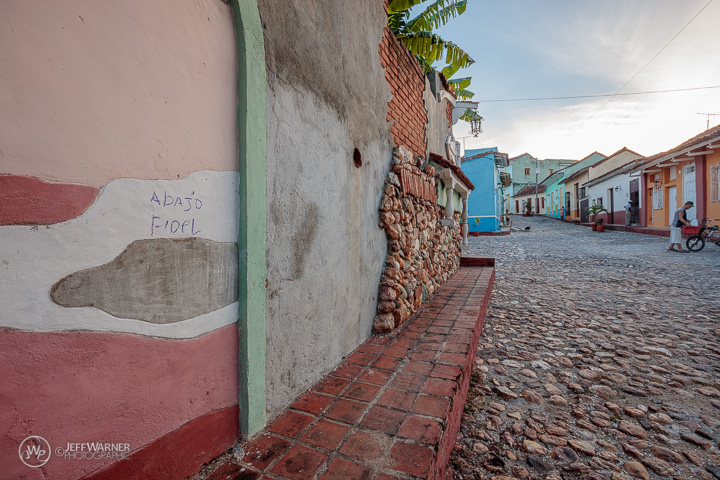Image: Abajo Fidel
During my two weeks in Cuba, it was the only single, solitary instance of negative sentiment displayed in public toward Fidel Castro, who died last night at the age of 90, that we had seen. Greg’s friend Miguel, who had lived in Sancti Spiritus for his entire 6+ decades of life, had never once–before that day–seen any such public defacement. Miguel appeared to be rather surprised, and yet seemed to ultimately brush it off to the recently impending changes in political climate that was so clear to see.
Abajo Fidel:

[TRANSLATION]: Raul Castro read this message dressed in olive green in his office, according to local TV and other state press in Cuba:
“With deep pain I appear to inform our people … that today November 25, 2016 at 10.29 p.m., the commander of the Cuban Revolution, Fidel Castro Ruz, died. Complying with the expressed will of Comrade Fidel his remains will be cremated in the early hours of Saturday, the 26th. The funeral organizing committee will provide our people with detailed information on the posthumous homage to the founder of the Cuban revolution.”
According to state media reports on the island.
Whether you mourn or cheer his passing, Fidel Castro stands as one of the few on earth who have thumbed their nose at the U.S. Government and lived to tell about it. Despot or hero? He was both to many, but his relentless stubbornness and antagonism toward America’s imperialistic pursuits in the region often put him at odds with being able to attend to his people’s needs. As the cold war era ended and the dissolution of the Soviet Union resulted in the hasty removal of financial support in 1990-91, Fidel’s centralized approach to the Cuban economy more often than not resulted in misery for his people. And yet with so little money or resources (due in large part to the ongoing embargo, considered by Castro to be a ‘blockade’), he was able to build rather progressive–and arguably successful–solutions to both medical care and education for the masses. His autocratic approach to governing led to many civil rights and free speech violations, and his unflappable vision of their country remaining ideologically separate from the West effectively determined that he doggedly pursue political strategies and tactics that left his people stuck in the past, still living amidst a crumbling 1950s infrastructure with no true investment in the future.
I have hope that Fidel’s passing will allow people here in the U.S. to have a more balanced and objective opinion of today’s Cuba, as it is now mostly unlike the vision that most cold war-era Americans have been led (fed?) to believe. There are not billboards of Fidel Castro all over Cuba (we saw one). There are no more people begging on the streets than here in the U.S., probably less, in fact. People are not carted off to prison daily, and in fact many political prisoners are being released. Free speech on the internet is not completely confounded in Cuba as it often is in places like China; there are many active bloggers in Cuba who can and do voice opinions that decades ago would surely have landed them in jail, although internet accessibility remains an issue, mostly one of technical infrastructure.
If you think that the people of Cuba are wholly suffering, you need to go there.
If you think that Raul Castro is just another extension of the militaristic rule of decades past, you need to go there.
If you think the economic embargo that has been waged upon this Caribbean island has been politically and/or socially successful (let alone acceptable) and should continue, you need to go there.
Don’t blindly accept what politicians like Marco Rubio foment about it ‘there’; he has never even been to Cuba.

